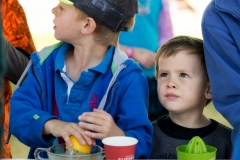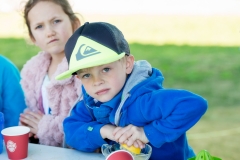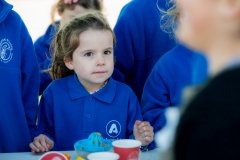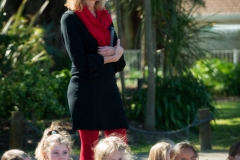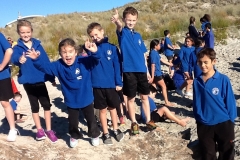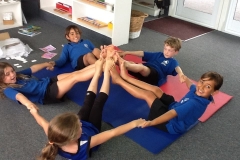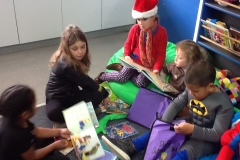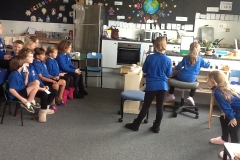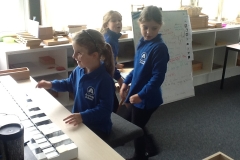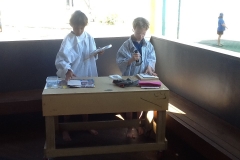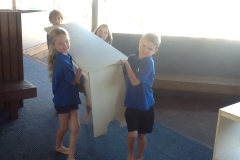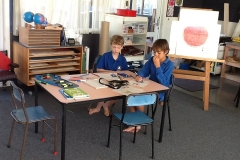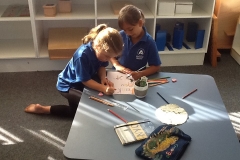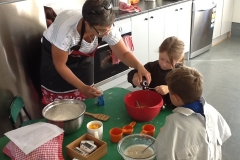Montessori primary is built on the foundations of early childhood.
When your six year old comes into primary from Montessori preschool, they will find much that is familiar in this new setting. The primary classroom environment is beautiful and thoughtfully prepared to support independent learning; it is child-centered, not adult-centered. There is access to the outdoors and the kinds of learning that can only take place in nature. Many of the beautiful, inviting Montessori materials from Montessori preschool are also found in the primary classroom where your child will use them in new ways suited to their expanding mind and make their own discoveries in language, maths and science. Perhaps most importantly, the other children in the class have a similar background of being treated with respect and support and have developed into confident, competent students.
The primary “curriculum” is only limited by a child’s imagination.
The goal of a traditional curriculum is to delineate what a child is supposed to learn. In Montessori, we want your child to be able to learn everything!
Meaningful learning happens when children are inspired by a lesson and begin to explore the subject and work on their own.
Children work collaboratively and cooperatively.
Primary children are at a different stage of development and have an h3 internal drive to be social and to collaborate. For this reason, most of the lessons and follow-up projects are done in pairs or groups of children. Each day, your child will practice the social skills necessary to plan and carry out his projects: delegation and division of labour, sharing resources, making group decisions, taking responsibility for actions and celebrating the success of peers. Conflict is not uncommon, but the motivation to resolve it comes from the children and their engagement with their projects. The Montessori teacher models and supports constructive and respectful problem solving. Learning how to work well with the different personalities and characteristics of other children in the classroom community is a significant life lesson with practical applications in the “real world” of high school, college and the professional workplace of the future.
The classroom is designed to nurture imagination and reason.
Primary age students are naturally curious and have an h3 internal drive to discover how our world works. They may ask, “How does a fish breathe under water?” “What number comes after a trillion?” “What causes a volcano to erupt?” Instead of simply giving them the correct answers, Montessori primary teachers ask the right questions; they tell stories to inspire the children’s imagination and tantalise them to explore on their own to find out more: about volcanoes and dinosaurs and Monet and gladiators and poppies and skateboards and butter churning and cheetahs and – there is no limit! Driven by their passions, the children are open to the input from the teacher that refines their reading, writing, reasoning and research skills. The focus is less on the facts and concepts we teach and more on what the children learn and how they learn it.
The children’s work is open-ended and creative.
Each child’s response to a lesson is unique and their follow up work reflects those individual differences. Your child is free to form or join a group to work with the concepts introduced in a lesson. Because the children are free to move around the classroom and see what others are doing, it’s not uncommon for an idea to spread; children are stimulated not just by the teacher’s lessons, but by each other.
Children are agents in their own education.
Children in Montessori have significantly more input into how they are taught, and control over how they learn, than children in traditional school settings. Their natural learning styles and preferences are respected and supported. The multi-age format of the classroom prevents comparison of children; differences in ability and achievement are expected. Lessons are presented in small groups to the children who are ready for them, regardless of their age. There is no social disadvantage to being bright, interested and motivated at school. Likewise, there is no stigma for reviewing or repeating lessons to gain mastery.
The children explore their own interests while meeting age-appropriate standards.
Montessori primary students study both broadly and deeply, covering many subjects not attempted in traditional schools. The children often develop expertise in a subject that is especially interesting to them. Because there is not a rigid schedule or prescribed curriculum that the whole class must follow, your child can focus intensely on her self-chosen work with minimal interruption. At the same time they will collaborate with the teacher to ensure that the basic skills for each grade are mastered. A version of the public school standards is available to the class and the teacher facilitates your child’s use of these standards as a guide to their work choices. To support their individualised plan of study, the teacher meets with students and parents regularly to plan and assess their progress.
The children are empowered to seek knowledge beyond the classroom.
We want the children to be comfortable navigating the world, not just our classrooms. As a result, the children must “go out” beyond the limits of the classroom to find the information or resource that they need.
Montessori primary children transition well into other schools.
At the end of the Montessori primary programme, your 12 year old is ready for a very important transition: becoming an adolescent. Their primary years have given them the freedom to develop as a unique individual. They have experienced the challenges and rewards of working with a group of other children of different ages and have seen their skills and talents put to use in many group projects. They have developed proficiency in all areas of academic endeavors and look forward to the new opportunities beyond Montessori primary. They love and trust the adults with whom they work. Above all, they are flexible and adaptable.
These skills, the culmination of the 6 year Montessori primary program, will help them to easily assimilate into new academic and social situations in high school, college and beyond.

